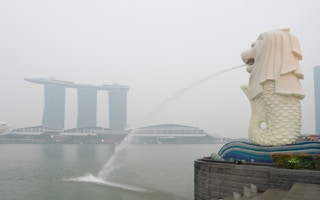The cooperation between Singapore and Indonesia to combat the region’s haze problems seems to have taken a turn for the worse.
On Saturday, Indonesia’s Minister of the Environment and Forestry, Dr Siti Nurbaya, said her ministry is currently reviewing all existing and planned bilateral cooperation with Singapore.
She added that some existing areas of collaboration under her purview would definitely be terminated, according to independent environmental news portal, foresthints.
Her comments follow a statement from Singapore’s National Environment Agency (NEA) last Wednesday which said that a court warrant had been issued against a director working for an Indonesian company suspected of contributing to the 2015 haze.
The next time the director enters Singapore, he or she would be detained by NEA officers under the Transboundary Haze Pollution Act (THPA), which gives local authorities powers to press charges against a director or a company not based in Singapore.
Both countries’ foreign affairs ministries also weighed in on the warrant issued by NEA.
Indonesia’s Foreign Ministry said last Thursday that it had “strongly protested” NEA’s action through its embassy in Singapore.
The next day, the Ministry of Foreign Affairs (MFA) in Singapore issued an official media statement on its website, saying it had not received any representation from the Indonesian Embassy.
The MFA statement added that the “THPA is consistent with international law, which allows a country to take appropriate action to protect itself from external acts which cause harm within the country. It does not encroach upon the sovereignty of any specific country”.
On Monday, the Jakarta Post reported that Indonesia’s Foreign Ministry insisted that its official complaint on the planned prosecution of the director had been sent through the Indonesian embassy in Singapore.
This is not the first time the THPA has been enforced. The NEA has issued six preventive measures notices to Indonesian companies although there has not been any convictions yet.
The THPA was passed in Singapore in 2014 and seeks to enhance Singapore’s ability to deal with transboundary haze. Under the Act, companies found guilty of causing haze can be fined up to S$2 million, even if they are based outside of Singapore.
Through the THPA, NEA is empowered to investigate and gather evidence into haze pollution, which is defined to have occurred if the 24-hour PSI (Pollutant Standards Index) is above 101 for at least 24 continuous hours.
Indonesia’s efforts to curb haze
Indonesia was the last country in South-east Asia to ratify the Asean (Association of the South East Asian Nations) Agreement on Haze Pollution in 2014.The 10 members of Asean had signed the agreement in June 2002 but Indonesia ratified it only 12 years later, four years later than any other member country.
Under the agreement, countries must cooperate in developing and implementing measures to prevent, monitor and mitigate transboundary haze pollution; and respond promptly to a request by a state that may be affected by transboundary haze.
Besides ratifying the Agreement on Haze Pollution in 2014, Indonesian President Joko Widodo also set up a Peatland Restoration Agency in January this year, which aims to restore 2 million hectares of peatland in seven provinces within five years.
The agency’s head, Nazir Foead, assured that there was “zero chance” that last year’s haze crisis would be repeated this year.
Between September and October last year, the PSI had nearly hit the 2,000 mark a couple of times in Indonesia, more than five times above the “hazardous” air quality base level of 350. During this same period, the 24-hour PSI in Singapore hit a high of 322, which is in the hazardous levels.
Scientists quoted by the US National Aeronautics and Space Administration (NASA) NASA said the 2015’s fires paced well ahead of anything seen since 1997-1998, when Indonesia’s fires were considered a global catastrophe.
What happened last year had “shocked” the Indonesian Government, said Nazir to reporters at the sidelines of the Dialogue on Sustainable World Resources held in Singapore on April 15.
Nazir had also promised multiple steps to tackle the issue. “We are not in a denial stage anymore, we’re in a stage of correcting the mistakes of the past.”

















